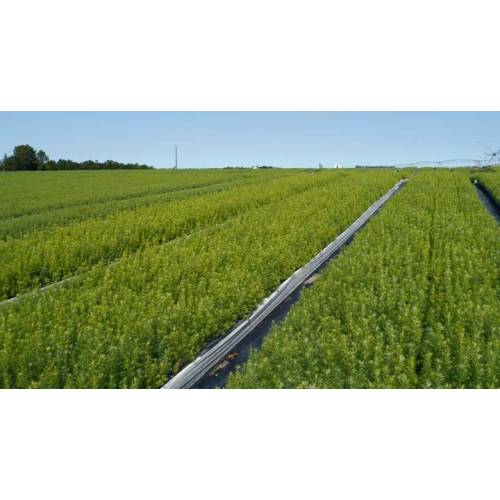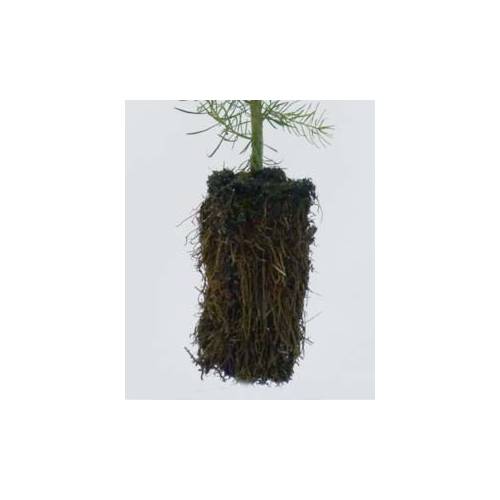
Douglas Fir Forestry
The production of young Douglas Fir plants
- Details
-
The Planfor nursery has the capacity of producing 20 million plants per year.
Specialised in producing root-balled plants, Planfor grows them in open worked containers in order to get the best roots system. The production is nowadays highly diversified: it counts more than 400 varieties of trees and shrubs. Planfor regularly increases its Douglas plants production and takes part in the effort of the French reforestation.
The Planfor nursery is today the leader of national production of young, root balled Douglas plants.
For Planfor, the Douglas is the 2nd variety produced, after the Maritime Pine.
Production cycle of young Douglas plants:
The production cycles of young Douglas plants must allow supplying quality plants during the entire planting season.
The recommended planting period is in spring, after winter is over.
In the nursery, the Douglas plants are sown in April and protected during winter.
Definition of what quality means for a young, root-balled Douglas Pine:
The quality of a young, root-balled Douglas Pine is assessed according to several criterions:
The roots and the ball
Trees roots have 2 vital functions:
- providing the tree's nutrition,v - the stability.
If one of these function is deteriorated it can greatly jeopardise the trees growth, hence the wood production.
It is therefore highly important that the root-balled plants possess a healthy roots system without any serious deformation in order to guarantee a good rooting and the development of the future trees.
Planfor innovates and develops its own growing supports to respond to this issue: MOTFOR 2000 ®
This has earned Planfor to win the industrialisation Grand Prix in 1993. It is thanks to its growing supports that Planfor produces root-balled plants which have dense root systems, with numerous rooting buds and without any serious deformations.
Moreover, the Planfor production's engineers work regularly on the development of even more efficient substrates, in favouring 2 research approaches :
- the nutritional elements available for young plants in the root- ball,
- the water-retention capacity of the root-ball.
The 'above the ground' part'
The quality of the part growing above the ground for a Douglas is defined according to several criterions:
- a balanced plant, with a good relation between its height and the diameter of its base,
- the presence of axillary,
- good colouring and lack of injuries.
The growing containers have a volume of 200 cm3 for an available growing height for the stem development of 25 cm2 which technically is excellent compared to a root-ball in a 100 cm3 and a height-growing surface area of 16 cm2.
A surface area of 25 cm2 allows better development with a base having the dimensions wanted and expected by the norms.
Ease of delivery
When ready, the plants must be delivered to their planting area. They must therefore being able to be loaded, transported and unloaded without impairing their quality. In the nursery, the plants are removed from their growing support and packed in wooden crates, a packaging which is non-polluting, environment friendly and easily reusable.
The packaging is a sorting intervention which obeys strict rules drawn up by our customers' specifications and the quality standards. Each crate contains 50 plants of homogenous sizes, in roots balls of 200cm3. These crates are identified thanks to labelling which allows controlling the traceability of the product: name of the variety, origin... Next the packaged plants are palletised and dispatched by carrier.
Ease of storage
The Planfor plants can be safely stored several days which facilitates the organisation of the work site.
Storage advice :
- on arrival, imperatively spread the crates outdoors, side by side ;
- Check the condition of the plants daily, water if necessary ;
- Pay particular attention to the crates placed on the edges as they dry out more rapidly ;
- Do not handle the plants in periods of frost and protect them.
Ease of planting
The planting period puts an end to month of growing and good cares received in the nursery and is going to determine the entire development of the trees. The skill of the planter is essential, but he must also be supplied with young plants which are easy to plant and of good conformation. Planfor has favoured the packaging of 50 plants so that the crates weigh less than 10 kilos each. Planfor has developed some crates transporting-equipment which eases their carrying on site. The weight rests on the planter's shoulders so his hands are free to plant. The root-ball of the plants does not measure more than 10cm in height and has excellent shape. The planter can easily plant the root-ball straight and without excessive tamping down.
In the end, a high quality's plant is the product of several factors. If one of the factors is bad, it is the entire end product which is hit, that is to say obtaining high quality trees for the future wood productions. - Photos (2)


